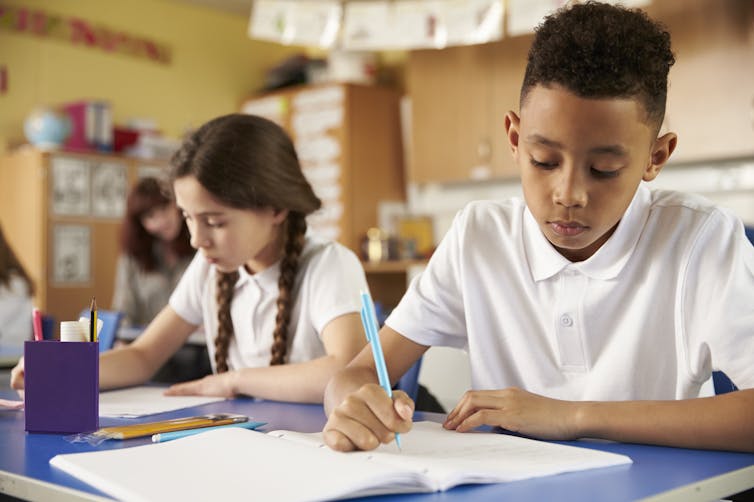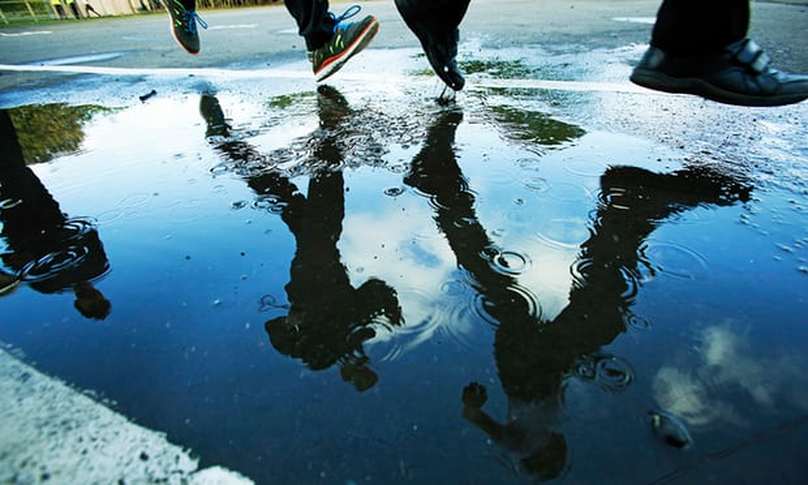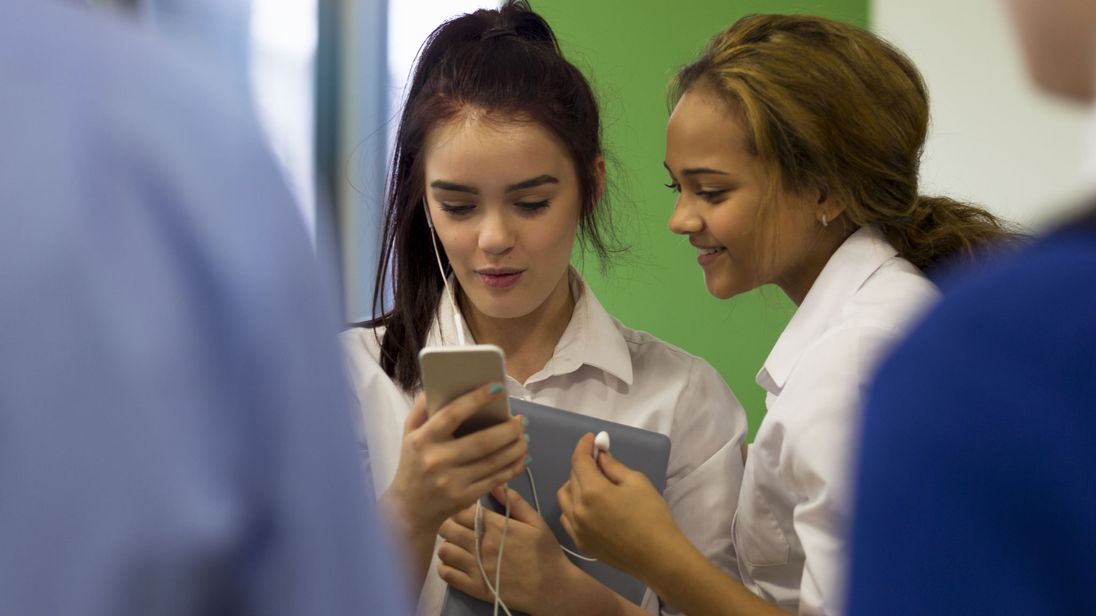School funding: promised increases are actually real-term cuts – and poorer schools are hit hardest
Recent changes to school funding in England mean that, although there may seem to be more money for education, in general schools will be worse off in 2021 than they have been over the last few years. In the second half of 2019, the government announced a £14 billion increase in funding for schools in England. This is over three years: £2.6 billion in 2020-21, increasing to £4.8 billion in 2021-22 and £7.1 billion in 2022-23. The National Education Union (NEU) analysed the figures, and despite the cash injection, found “a strong link between deprivation and the scale of government cuts to school funding”. The NEU suggests that, when inflation is taken into account, over 16,000 schools will have less income in April 2020, compared to 2015. Over the past decade, school spending per pupil in the UK has fallen by about 8% in real terms. According to the Institute for Fiscal Studies, this is the largest decline since at least the 1970s. For historical reasons to do with how funding used to be calculated, these cuts will hit schools in the most disadvantaged areas hard. Feeling the effectsChildren in classrooms – particularly in disadvantaged areas – are already feeling the very real effects of funding cuts. Staff are being made redundant, schools have fewer resources, and some schools are even considering closing for half a day per week to save money. Recent apparent funding increases are in fact real-term cuts – and teachers and parents are rightly concerned. In April, a survey of 8,600 teachers and other school staff conducted by the National Education Union found that 91% of teachers felt that poverty was a factor in limiting children’s capacity to learn. Three-quarters of those surveyed blamed poverty for children falling asleep during lessons, being unable to concentrate and behaving badly. 
Many teachers in schools face these problems every day, while also having to handle issues that arise as a result of austerity and cutbacks to other services, such as health and social care. As a result, nearly half (45%) of teachers surveyed said that they have spent their own money buying basic necessities for pupils in the last year. Yet current government policy does nothing to level the playing field in terms of structural inequalities: in fact, it reinforces them. A complex systemSchool funding in England is complicated, partly because there are so many kinds of schools – between 70 and 90, on one estimate – and partly because the mechanisms change quite often. It’s also complex because there are so many rules, depending on whether pupils are certain ages, or have special educational needs. In general, however, people tend to have two key concerns: how much money is going into schools from the government, and whether this money is being distributed fairly. All children in England between the ages of five and 16 are entitled to a free place at a state school. There were nearly 9m children in English schools in January 2019: about half of the pupils in state-funded schools in England are in maintained schools, and about half in academies and free schools. Maintained schools are so called because they are funded and controlled by the local authority. Maintained schools must follow the national curriculum and other rules, for example about teachers’ pay and conditions. Academies and free schools are state-funded, non-fee-paying schools, which are are independent of local authorities and operate outside of their control. These schools are run by trusts or sponsors such as parents’ groups or businesses. They still get funding from the government, but they can decide how to spend their budget themselves, and they can set their own entrance criteria. A 2013 report by the Academies Commission stated that it received evidence of some popular schools, including academies, attempting to select and exclude certain pupils; there tends to be a decrease in the proportion of disadvantaged pupils enrolling in academies, and a resultant increase in intakes in maintained schools. The fact that academies set their own admissions policies “attracted controversy and fuelled concerns that the growth of academies may entrench rather than mitigate social inequalities”, according to the report. Fair funding?The National Funding Formula (NFF) is the formula that is used to allocate school funding. This is a basic per-pupil funding allocation, and then there are adjustments for things like additional needs. The NFF is used to calculate funding for individual schools, and then the total for an area is calculated and the amount passed on to the local authority. Councils then set their own formula, in agreement with school forums made up of head teachers, to distribute the cash. The formula must include both a basic local funding unit for each pupil attending the school, and a measure of deprivation. It can also take into consideration some other elements, such as the number of pupils with English as an additional language. Academy funding comes directly from the Department for Education (DfE); local authorities instruct the DfE how much to pay each academy in their area. This is all quite likely to change, though – and then it is possible that NFF funding will be paid directly to all mainstream schools. Another important source of funding for schools is the pupil premium, which was introduced by the government in 2011. The amount is allocated based on the number of pupils who are or have been eligible for free school meals, and also those who have parents in the armed forces, and intended to raise the attainment of disadvantaged pupils. Schools are accountable for how they spend the pupil premium, but they don’t have to spend it just on eligible pupils. So the question remains: why are measures such as pupil premium and the national funding formula failing to level the playing field? Rising costsIn July 2019, the Education Select Committee reported that it was clear that pupil premium was not always directed at disadvantaged children – rather, it is often used to make up shortfalls in school budgets. As the select committee noted, schools should not have to choose between running their core operations and supporting disadvantaged pupils. The fact that this is happening shows that there is simply not enough money in the school funding system. School costs have increased across a range of areas, including annual pay award and salary raises, inflation, pensions and special educational needs provision. School funding has not kept pace. Jon Andrews, director for school system and performance at the Education Policy Institute think-tank, said that the government’s policies on education funding “target money towards schools with less challenging intakes and lower levels of disadvantage – at a time when progress in closing the gap between disadvantage pupils and their peers has stalled”. Promised increases to funding are likely to be real-term cuts. Schools and children are suffering because of inequitable policies – and this will have far-reaching consequences for the economy and wider society, long into the future. Janet Lord, Faculty Head of Education, Manchester Metropolitan University This article is republished from The Conversation under a Creative Commons license. Read the original article.
1 Comment
This is a great Guardian article, published today, by Kay Holmes. I've always been interested in transitions, and as a corollary, in rites of passage. This week we have had graduations at Manchester Met, and we are starting to think about next year's intake and their transitional experiences. I'm interested in identity change - or whether identity does change with transitions in education? I'm also interested in the rituals and rites of passage that accompany transitions - in Germany, what is called 'schooling in' - as parents and children are welcomed into 'big school'. I think in HE we send out mixed messages about this. And certainly the transition to secondary school is a step for children where they are quite suddenly 'left alone'. For most secondary schools parents are positively discouraged from coming into school- a big contrast from many primaries. So what are we trying to do with transitions? Who is making the transition? And if we believe in situated and co-constructed learning then certainly secondary schools and probably HEIs need to think a bit more about how they do this - if it is the case that transitions are key in identity change, then they are of significance in determining all kinds of aspects of children's lives. And if this article is to be believed - and it certainly includes food for thought - the transitions for parents and other family members are likely to be significant in terms of identity and family dynamics.  Saying goodbye to your child’s primary school? I never knew how much I’d miss it | Kay Holmes | Opinion The little girl who once hugged me at the gates has moved on, and the change to secondary school has come as a shock ‘Most parents of year 6 children, as I know from recent experience, won’t be braced for how different their lives as parents is are about to become.’ Photograph: Murdo MacLeod for the Guardian My first day in the school playground was terrifying. Everyone else seemed to know each other. Chatting, laughing clusters of comfortable, relaxed people made connections and bonded. I decided – out of sheer defensiveness – that was not for me. I would instead enter and leave the playground untouched by human contact. No chatting, no laughing, and definitely no PTA meetings or arranging the summer fair. The parent-teacher association was all the cliches: middle class, do-gooding, ravenous for women’s free time That lasted about a week. My daughter became close friends with two girls and I followed suit with their mothers. As my child’s friendship circle expanded, so did mine. I began to bake cakes for events and tried to control my competitiveness. I lugged innumerable huge folding tables from dark corners and pinched my fingers setting them up. I ventured into the dank horror of the disco room at parties where sugar-enraged under-10s sweated out manic interpretations of Lush Life and Uptown Funk. My friend Liz and I cornered the tombola market. It involved a certain amount of maths to work out the ticket-stubs--to-prizes ratio, and a certain amount of sitting on the floor chatting while sticking prize numbers on to re-gifted condiment sets and bottles of wine. Many afternoons standing behind a trestle table in a playground selling baked goods were enlivened by the spectacular rudeness of our customers. So keen was I to prove my lack of professionalism that I met rudeness with sarcasm and once yelled after a man – who was passive-aggressively chuntering about “very expensive cakes” – that “they aren’t expensive at all sir, and this is for your children!” And against my will I was drawn into the PTA. The parent-teacher association was all the cliches you can throw at it – middle class, do-gooding, prescriptive and ravenous for women’s free time. But it raised some money, staged some joyful communal events, and tried to include everyone. And there’s the rub. This was the month of summer fairs and of farewells. Most parents of year 6 children are now facing the last day of primary school, but they will also be throwing their thoughts and worries forward. What they won’t be, as I know from recent experience, is in any way braced for how different their lives as parents are about to become. The little girl who used to hold hands with me all the way to school and hug me fiercely in the playground is now a year 7 who salutes me cordially some distance from the train she takes with her friends to a school in a different part of the city. After wandering fairly freely through her primary school on PTA business, I couldn’t enter her secondary school if I wanted to because there’s a guard at the gate. He’s very nice, but holding a Victoria sponge and mumbling about raffle tickets is going to butter no parsnips with him. Misanthropic me should be pleased not to be rubbing shoulders with other parents at drop-off. And – full disclosure – it is a relief. But it’s a shock to discover how suddenly school becomes none of your business. For children, it’s the first stage of preparation for the adult world. The separation is natural and right and has to happen. So I hope those parents paused to enjoy the dreaded summer cake sale – and revelled in the arguments over whether or not to have a bouncy castle, or buying versus renting a popcorn machine. Things will change fast: you’re one summer away from a different world that even a diehard curmudgeon can acknowledge is a bittersweet experience. • Kay Holmes is a freelance writer
I use phones and ILT in my teaching a lot - but this article from Sky News talks about banning mobile phones in school all together. And interestingly, in a poll on the Sky News website this morning, 80% of respondents have suggested that mobile phones should be banned from schools all together. The culture secretary misrepresents the findings of a 2015 study when he says that results are impacted by students even just having phones in bags *how cold that be - it is nonsense!) The 2015 study (available here...cep.lse.ac.uk/pubs/download/dp1350.pdf) suggests... By exploiting differences in implementation dates, our results indicate that there is an improvement in student performance of 6.41% of a standard deviation in schools that have introduced a mobile phone ban. The existing literature on the impact of technology in the classroom implies that the unstructured presence of technology has ambiguous impacts on student achievement. We add to this by illustrating that a highly multipurpose technology, such as mobile phones, can have a negative impact on productivity through distraction. Schools that restrict access to mobile phones subsequently experience an improvement in test scores. However, these findings do not discount the possibility that mobile phones could be a useful learning tool if their use is properly structured. Our findings suggest that the presence of mobile phones in schools should not be ignored. Finally, we find that mobile phone bans have very different effects on different types of students. Banning mobile phones improves outcomes for the low-achieving students (14.23% of a standard deviation) the most and has no significant impact on high achievers. The results suggest that low-achieving students are more likely to be distracted by the presence of mobile phones, while high achievers can focus in the classroom regardless of whether phones are present. Given heterogeneous results, banning mobile phones could be a low-cost way for schools to reduce educational inequality. So what is interesting here is two things; firstly, the structured and considered use of mobile phones in scjools can be useful - and with the increase in interactive technologies, that's no surprise. And secondly, and worryingly - there is a difference in the effects that phones have on different kinds of pupils. Banning mobiles has most efect on low achieving students, and less of an effect on higher achieving students. I think this needs more investigation - this is a research project that I am really interested in. The Sky news article is below.... 
Culture secretary Matt Hancock says schools should ban mobile phonesNot content with barring them from the classroom, Matt Hancock suggests they be confiscated from children at the start of the day. Children should be banned from using their mobile phones at school, the culture secretary has said. Not content with merely barring them from being used in the classroom, Matt Hancock has suggested that they be confiscated from children who carry them at the start of each school day. Writing in The Daily Telegraph, he warned that mobiles could have a "real impact" on students' achievements and leave them exposed to increased amounts of bullying. He also questioned why youngsters needed to bring their phones to school in the first place. "There are a number of schools across the country that simply don't allow them," he said. "While it is up to individual schools to decide rather than government, I admire head teachers who do not allow mobiles to be used during the school day. I encourage more schools to follow their lead." Mr Hancock said that "setting boundaries" in relation to how much children were exposed to technology - and notably social media - was vital in protecting them from harm and encouraging them to use the internet safely. "Studies have shown that mobile phones can have a real impact on working memory and fluid intelligence, even if the phone is on a table or in a bag," he added. His column was supported by a letter from seven fellow Tory MPs, also published in the newspaper. Citing a 2015 study by the London School of Economics, they write: "Where schools banned smartphones from the premises, or required them to be handed in at the start of the day, pupils' chances of getting five good GCSEs increased by an average of 2%. "The improvement was even more marked for lower-achieving pupils. Results among pupils in the bottom quarter of achievement improved twice as much as the average."
https://news.sky.com/story/culture-secretary-matt-hancock-says-schools-should-ban-mobile-phones-11410459
|
About me...
I was a psychology and social sciences teacher for many years and now I am in the throes of a leadership, teaching and research career in HE. I care passionately about education. This blog will show you why and how.
Categories
All
Archives
March 2023
|

 RSS Feed
RSS Feed